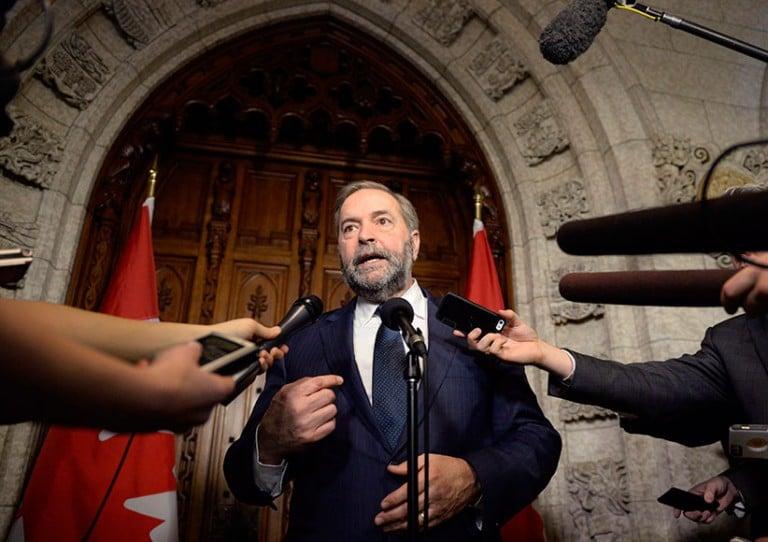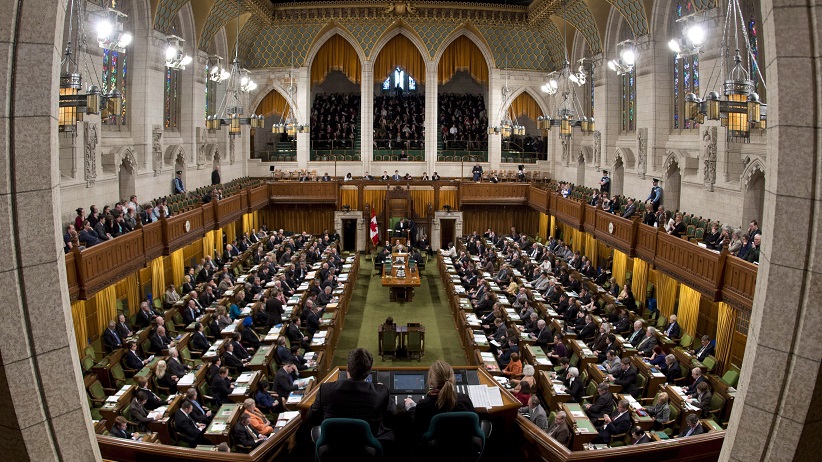For Tom Mulcair, wretched governance is measured in absolutes
Tom Mulcair, like Michael Ignatieff before him, loves to oppose the Conservative government in bulk

NDP leader Tom Mulcair speaks to reporters about the federal budget on Parliament Hill, Tuesday, March 22, 2016 in Ottawa. (Justin Tang/CP)
Share

Maclean’s is your home for the daily political theatre that is question period. If you’ve never watched, check out our primer.
QP’s must-see moment
The people who hate Stephen Harper’s tenure as Prime Minister have always loved lists. They fill lists with examples of wretched governance measured only in absolutes. Michael Ignatieff, the last Liberal to lose miserably to Harper’s electoral machine, introduced a motion of non-confidence that ran through the Harper team’s “unique distinctions” to that point.
“We have a government with the largest deficit in Canadian history,” Ignatieff said on March 25, 2011. “It is the highest spending government in Canadian history. It is the most wasteful government in Canadian history. Finally, it is the first government in Canadian history to face a vote of contempt in this House.” Later that day, the House collectively found that deficit-ridden, high-spending, wasteful government to have also been contemptuous of Parliament. And it was off to the races. Ignatieff said voters could choose the red or the blue door, and they flocked to the blue door and even crowded into an orange door that the Liberals forgot to mention.
Ignatieff couldn’t convince enough voters that his party offered a functioning alternative to a gang of Tories who, he claimed, were just plain bad with money and cavalier with Parliament’s definition of contempt. Today, another opposition leader took his turn with a rap list of Conservative ethical breaches. Thomas Mulcair faced the Prime Minister’s empty chair during question period, and off he went.
“They’re retroactively rewriting laws to stop a police investigation,” he said, referring to legislative changes buried in the government’s latest budget bill, C-59, that would exempt records related to the defunct federal long-gun registry from the Access to Information Act—and apply that exemption retroactively to Oct. 25, 2011, the day the government tabled a bill to kill the registry. That’s particularly problematic because Canada’s information commissioner says the RCMP broke the existing access law by refusing to release certain registry-related documents to a member of the public. C-59 would make legal the Mounties’ allegedly illegal conduct.
Mulcair continued. “The Prime Minister’s own chief of staff ordered an audit report altered to help Mike Duffy,” he said, shining a light on emails obtained by the RCMP that appear to indicate ex-PMO chief of staff Nigel Wright working with Conservative senators to remove sections of a controversial Senate audit of Mike Duffy’s troublesome expenses.
“Now, Conservatives are blocking the release of the full details from the investigation on Senate residency,” Mulcair went on, reminding the House of an apparent Senate audit that Duffy’s defence thinks may be helpful to the suspended senator’s cause, and wants entered into evidence at his trial—but which the upper chamber won’t release. Evidently, neither will the government.
Mulcair summed things up in what might be the strongest terms possible. “This Prime Minister is retroactively legalizing obstruction of justice. Will the Prime Minister release the full Senate audit on Mike Duffy’s residency for all Canadians to see?”
In Harper’s absence, Public Safety Minister Steven Blaney answered for the boss. His reply didn’t address the question, and only included some insistence that the bearded leader of the New Democrats allow a free vote on a firearms bill.
Back in 2011, Ignatieff capped his flourish with a pre-emptive eulogy for the Tories. “This is a government and a Prime Minister that is out of touch and is out of control. It is time for a change,” he pleaded. Mulcair didn’t go that far today, but with mere weeks before the House rises in advance of a federal election, it surely won’t be long before Mulcair waxes optimistic about his own ambition to do what Ignatieff never could: capture the Prime Minister’s perch in the Commons.